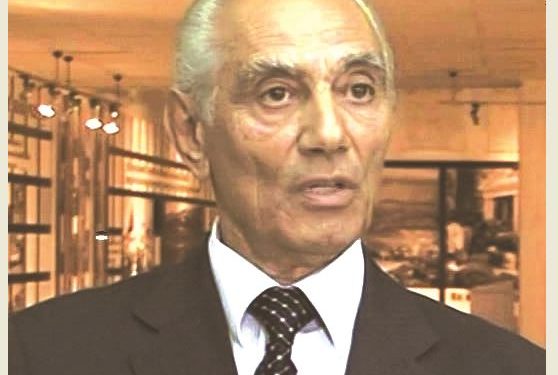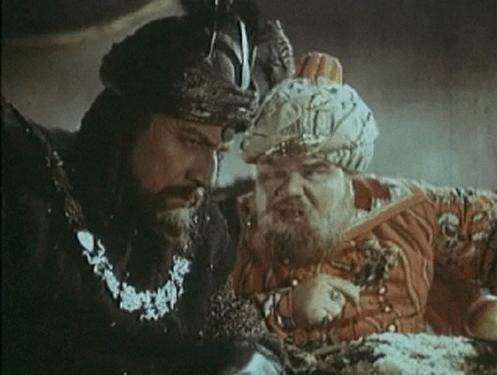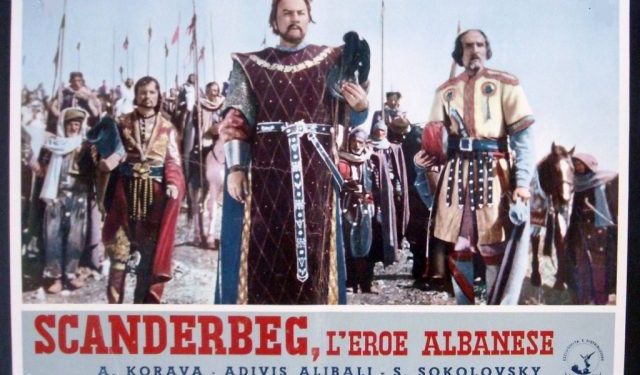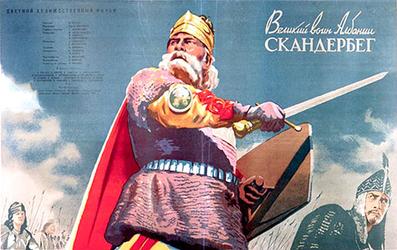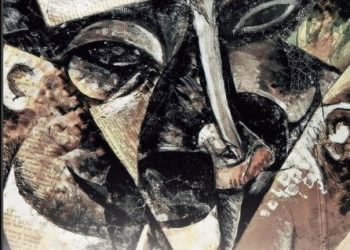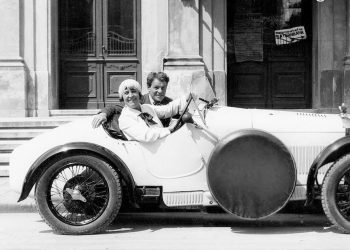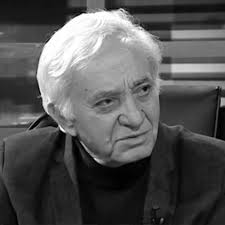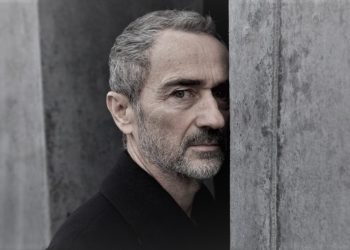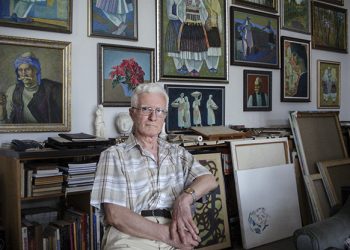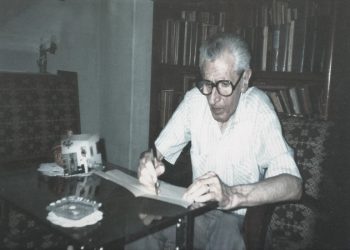Memorie.al / In April 1949, a delegation of our Government led by Enver Hoxha went to Moscow. The head of the delegation himself, on April 4, submitted the following request to the Ministry of Foreign Affairs of the Union of Soviet Socialist Republics. ‘The Albanian Government Delegation, which is currently in Moscow, expressing its respects to the Ministry of Foreign Affairs of the USSR, has the honor to announce the following: The Government of the People’s Republic of Albania, wishing to make a feature fil1m about the life of the national hero of the Albanian people, about SKANDERBEG, and about the struggle of its people against the Ottoman occupiers, requests the Government of the USSR to be kind enough to agree that this film be made by Soviet cinematography and with the participation of Soviet artists.
Considering the above, the Government of the People’s Republic of Albania requests the Government of the USSR that, if possible, within 1949, a Soviet writer be sent to Tirana, who, in cooperation with our relevant persons and institutions, will present the libretto, on the basis of which the film mentioned above will be made. On this occasion, please accept our sincere respects.’
The Head of the Albanian Government Delegation
Prime Minister of the People’s Republic of Albania
Enver Hoxha
In March 1953, the artistic group of Soviet cinematography for the film Skanderbeg, led by director Sergei Yutkevich, arrived in our country, who had declared in a narrow circle that; he did not wish to direct the filming of this movie.
Akaki Khorava, “People’s Artist,” decorated with 2 “Lenin” orders and 5 times a laureate of the “Stalin” prize, Deputy of the Supreme Soviet of the Soviet Union, Director of the “Rustaveli” Theatre of Tbilisi; Veriko Andjaparidze, “People’s Artist,” three times a laureate of the “Stalin” prize, accompanied by artists and the filming crew.
They were greeted at the port of Durrës. Along with director Yutkevich, assistant Viktor Stratobërdha and the actors, 6 white horses also arrived. Unfortunately, the horse that our hero was supposed to ride died, so Akaki Khorava had to use another horse. In the film, original chairs from Skanderbeg’s time were used, donated by a family in Mirdita.
The main and largest part of the film was shot in the Soviet Union. In our country, the film would be completed with the participation of our artists, and the Albanian dubbing version of the film would be processed at the “New Albania” Film Studio. The script was by Mikhail Papavas. The Albanian spectator could hardly wait to see his national hero on screen, when the first attempts by the Italians had failed.
On November 8, 1953, before the film “Skanderbeg” was shown in Moscow, Sergei Yutkevich watched the dubbing of the film that came from Tirana. Our representative, Mihal Prifti, informed with document No. 1223: “Yutkevich is not satisfied at all.”
According to his statement: “The Albanian dubbing loses 50% of the artistic value of the Soviet original. He is particularly dissatisfied with the one who replaced Khorava in the role of Skanderbeg. His monotonous voice does not correspond to either Skanderbeg or Khorava” (the voice belonged to Lec Bushati. S.M.).
He expressed himself as follows: “If I were the Albanian government, I would not accept the Albanian version, but would dub Skanderbeg again.” He proposed Naim Frashëri, who could dub Skanderbeg very well, and someone else for the other role. However, considering the script, music, etc., the film will still turn out well. And our cinematography comrades who saw it say that there are many differences between the Russian version and the Albanian one. There is no change regarding its launch.”
On November 28, 1953, simultaneously in the main cinemas of Moscow and in the “17 Nëntori” and “Republika” Cinemas in Tirana, the first premiere of the film “SKANDERBEG” was held. In our country, it was rightly classified as a great color feature film. There were numerous articles published in newspapers, where various people expressed their opinions about the first feature film after the liberation, with an Albanian theme and realized through a fruitful cooperation between “MOSFILM” and the “NEW ALBANIA” Film Studio.
Here are some of the newspaper headlines: “The film Skanderbeg is a masterpiece of Soviet cinematography.” These words were said by Bedri Spahiu, a member of the Political Bureau of the Central Committee of the APL. I cannot understand how a high-ranking official expressed himself so irresponsibly. The main weight in the film was carried by the Soviet producers, but the historical consultant was Prof. Aleks Buda; for the text, Llazar Siliqi; for the music, Çesk Zadeja; film painter, Stavri Rafael; costume designer, Gjinovefa Heba; ballet master, Panajot Kanaçi, as well as the Ensemble of Folk Dances.
Second director, Viktor Stratobërdha. In the main roles, alongside the Soviets, such as; Akaki Khorava (Skanderbeg); S. Sokolovski (Hamzai); Veriko Andzhaparidze (Dafina); Papazyan (Sultan Murad); Zhakov (Tanush Topia), etc., our distinguished artists also interpreted, such as Naim Frashëri (Pali), Mihal Popi (Ballaban Pasha), Besa Imami (Donika Kastrioti), Adivie Alibali (Mamica), Loro Kovaçi, Ndrek Shkjezi, Mihal Stefa, Marie Logoreci, Sokrat Miho, Stefan Pali, Kadri Roshi, Aleko Sokoli, Zef Jubani, Llukë Kaçaj, Jani Nano, Kristantho Kotmilo, etc.
“Excellent realization of Soviet cinematographic art,” said the composers Kristo Kono, Mustafa Krantja, Baki Kongoli, when their colleague Çesk Zadeja had put the suite of Skanderbeg’s return to Kruja on the staff.
“A great color film about the heroic past of our people.”
“The film Skanderbeg, a true school for our actors.”
“We wholeheartedly thank the Soviet Union.”
“Another proof of the unbreakable Albanian-Soviet friendship.”
“A living love for our heroic past.”
“Just as I imagined Skanderbeg, so I saw him in the film.”
“We thank the Party and the Soviet Union.”
“Symbol of eternal friendship.”
“A precious gift of great friendship.”
“Far-sighted leader and politician,” – said Zihni Sako.
“Excellent interpretation.”
“The people created their heroes and their history.”
“Great Albanian warrior.”
“I also managed to see Skanderbeg” (An 80-year-old man from Kruja).
“The film Skanderbeg is a great educational work.”
“I cannot express my joy.”
“We are proud to bear the name of Skanderbeg.”
“It increases our love for the homeland even more.”
“My heart swelled.”
In truth, the film “Skanderbeg – Great Warrior of Albania,” was shown for the first time in our country in “Stalin City” (Kuçovë), where there was an entire neighborhood of Soviet specialists working in the oil field, in production and in research institutes. It is said that there were about 350 Soviet families.
Among them was an Azerbaijani named Muhamet Behov, a former veteran of the Soviet Communist Party, a friend of Lenin, a professor at “Lomonosov” University in Moscow, and Chief Engineer in the oil sector in our country. He himself was a Muslim, while his wife, Zinaida, was an Orthodox Russian. They celebrated both Bayram and Christmas and Easter.
He, in agreement with the Soviet Embassy in Tirana, brought the film and the main actor, Akaki Khorava, from Moscow. The actor and the film arrived by plane at Rinas airport, and from there, also by plane, to “Stalin City.” The film was shown the next day. Akaki Khorava left for the Soviet Union. He was not in Tirana on November 28, the day of the premiere. In Moscow, the film was shown in several cinemas, and for two weeks, you couldn’t get tickets. The figure of Skanderbeg created such sympathy that children, when playing with swords, would divide into two groups, as usual, and try, who would be Skanderbeg.
On April 4, 1954, “Zëri i Popullit” announced that a day earlier, “on April 3, 1954, the 7th International Film Festival is taking place in Cannes. The Soviet delegation consisted of G. Aleksandrov, Lyubov Orlova, Sergei Yutkevich, Akaki Khorava, Klara Luchko, and Litvinenko. The local newspaper ‘Le Patriot’ wrote: ‘Excellent interpretation of ‘Skanderbeg’ by Akaki Khorava, good performance of other actors, excellent music, and high technique.'”
It is an interesting fact that, according to A. Fortuzi and F. Sllatina, the film “Skanderbeg” was presented on behalf of Albania, while Soviet cinematography was presented with another film, since in the Cannes Film Festival in those years, a country could not be presented with two films.
On April 10, two announcements were sent from Paris: “The film ‘Skanderbeg’ was a success at the Cannes Film Festival. The film was shown on March 26. Only the Italian delegation left the hall. The Grand Prize was awarded to the Japanese film ‘Gate of Hell.’ ‘Skanderbeg’ and several other films received the International Prize. It received the first prize for direction, for Yutkevich, and the first technical prize from the high technical commission of cinema for the colors.
Before the start of the festival, the Turkish embassy in Paris had protested to the jury that the film should not be shown. Its echo was great. Three French companies had requested 40 or 50 copies to show the film in France, French dubbing. Italy sought to buy it on the condition that some cuts are made.”
As for the claims from the Turkish side, it was more than natural, since the Turkish state still claims and wishes to call Gjergj Kastrioti a Turk, and even considers him a traitor to the homeland, that is, to Turkey, for what he did, and his archives are still closed for the figure of our National Hero. The claims of the Italian side are also related to the parts of Venice’s intervention in our politics of that time.
On April 13, 1954, in Paris, the France-USSR Friendship Association showed the film “Skanderbeg, Great Warrior of Albania” at the Grand Theatre of the Champs-Élysées, attended by the Secretary of the French Communist Party, Jacques Duclos, and numerous personalities of art and culture.
On April 24, 1954, the Presidium of the People’s Assembly of the People’s Republic of Albania decreed the collective that participated in the making of the film; “Skanderbeg, Great Warrior of Albania”:
With the Order of Class I: Mikhail Grigorevich Papava (screenwriter), Sergei Iosifovich Yutkevich (director), Akaki Alekseevich Khorava (actor in the role of Skanderbeg); with the Order of Class II:
Evgeny Nikolaevich Andrikanis, G. V. Sviridov; with the Order of Labor of Class I: Simon Grigorievich Sokolovski, Vladimir Romanovich Sollovjev, Nikolai Aleksandrovich Levkojev; with the Order of Labor of Class II: Boris Alekseevich Volski, Mikhail Sergeevich Chikiriev, Olga Simonovna Kruchinina, V.K.Breances; with the Order of Labor of Class III: Alexei Ivanovich Niekrov. With the Order of Labor of Class I:
Shemsi Xhemil Totozani, Aleks Taqi Buda, Besa Ferit Imami, Çesk Rrok Zadeja, Llazar Risto Siliqi, Mihal Jorgji Popi, Naim Servet Frashëri, Viktor Sotir Stratobërdha; with the Order of Labor of Class II: Frano Mark Jakova, Sofokli Taqi Buda, Shyqyri Tahir Behri, Andrea Stefan Mëhilli, Adivije Haki Alibali; with the Order of Labor of Class III: Gjenovefa Heba, Stavri Kristaq Rafail, Selman Vaqari, Lec Luigj Bushati, Kadri Maksut Roshi.
With the Medal of Labor: Llukan Stefan Tako, Gjergj Spaso Zagora, Matish Shiroka, Zef Jubani, Besim Avdul Levonja, Ndrek Palok Shkjezi, Krisanthi Llambi Kotmilo, Aleko Gorçi Skali, Lec Pjetër Shllaku, Ndrek Mark Luca, Llazar Filip Çurnaçi, Sandër Jovan Prosi, Behije Ahmet Çela, Gjon Simon Karma, Pjetër Gjok Gjoka, Mihal Dhimitër Stefa, Sokrat Miho, Loro Gjon Kovaçi, Spiro Urumi, Raqi Jankulla, Andrea Sotir Minga, Stefan Palok Pali.
Curiously, the actress Variko Andjaparidze, who interpreted the role of Dafina with great truthfulness, was not decorated by the Presidium of the People’s Assembly.
From the middle of May, the film “Skanderbeg” was shown with success in Budapest. On June 23, (“Zëri i Popullit,” No. 148), it was announced that the French and Italian press, through numerous newspapers, among them those dated March 29, 1954, under the title “Skanderbeg, a new masterpiece of Soviet cinematography,” wrote: ‘Rézhy Berzheren, of ‘L’HUMANITÉ’: ‘Skanderbeg made a great impression from the beauty of the film’s colors, from the quality of its staging, from the feelings that inspire it, from the extraordinary power of its subject and the scenes that are presented.'”
Koziragi of “UNITA”: “Skanderbeg, which was shown on the second night of the festival, deserves the Grand Prize. It is a color film with 12 chapters. They are the 12 fundamental phases of the hero’s life, from the childhood of the small prince Gjergj Kastrioti, who was snatched from his family and taken to Turkey to become a Janissary of the Sultan, until the undefeated old age of the leader. Skanderbeg prevented the Turks from invading Italy, which they had in mind.”
But what happened later with the film Skanderbeg? It was banned from being shown in our country for two flimsy reasons: first, because it was a co-production with the Soviets, “who betrayed Marxism-Leninism,” and second, because “two undesirable people participated,” assistant director Viktor Stratobërdha, who was convicted because of the stance he took at the Conference of Tirana in 1956, and Adivie Alibali, because her husband, Jusuf Alibali, a jurist, publicist, poet, historian, and lecturer at the Faculty of Law, not only had studied in Moscow and covered the page on foreign policy in the newspaper “Zëri i Popullit” and was consequently considered a liberal intellectual, but also had ties with Fadil Paçrami.
The hostile attitude towards him increased because two of his brothers, Xhevat, a former officer, was convicted with the Beqir Balluku group, and Ylli, who studied in Poland, married to a Pole, not only worked in the Ministry of Trade, but “was following” the minister Kiço Ngjela.”
Curiosities about the film:
1 – In the script, there was a part where Skanderbeg (Akaki Khorava) would kiss Donika (Besa Imami), but she refused.
2 – On July 8, 1936, the Albanian tennis champion Sali Nallbani was invited to Stockholm and faced the Swedish champion, Stellan Crammer, whom he defeated, taking the honor prize proposed by the Consul General of Albania in Stockholm, Franklin Gardlund.
When he returned to Albania, the cup was exhibited at the Kacelve palace in the center of Tirana, in the window of Gjon Lacaj’s tailor shop. There, during the filming of the movie, the National Flag was unfolded, and above it, the cup. It was that Cup that Akaki Khorava used during the filming of the movie Skanderbeg.
3 – In one of the three courts of the “Nallbani Tennis Club,” where Myslym Shyri Street is now located, Akaki Khorava played tennis in his free time.
4 – In the premises of the Church of St. Procopius, the parts related to Venice were filmed.
5 – The numbers in the text relate to the sources from which they were taken. Those interested can use the essay book “THE SEVENTH ART IN TIRANA,” published in 2011. Memorie.al




